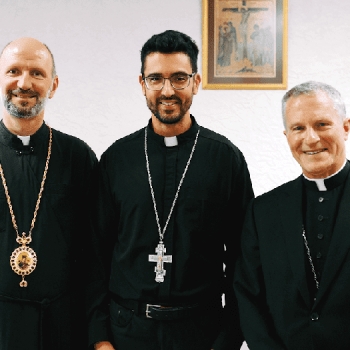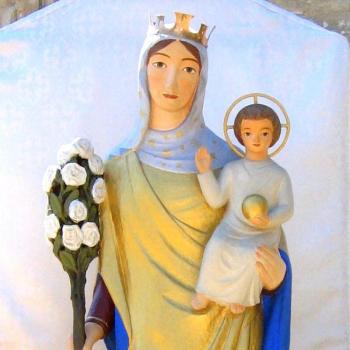The Way of Sorrows is the Way of the Cross. It is a process of being open to, and acknowledging, and fully living through those times in our lives when we know humiliation, or hardship, or failing, or shared suffering. One of the stops on the Way of the Cross is entitled "Jesus Meets His Mother," and we have seen that powerful image played out over and over in these past weeks.
A few days ago, I watched as Mom fed her dying son his supper, patiently holding small spoonful after small spoonful to his lips, encouraging him to swallow and take a little more, offering him a drink, dabbing at his lips. Occasionally, watching him do the hard work of simply eating, she would shake her head sadly and offer him another bite.
I watched this unshrinking woman -- a woman who, ten years ago, would have told you that she could not possibly endure such a reality -- feed her son a pureed meal from his dish, while she nourished him -- and the rest of us present -- in a completely different way, with her unconditional love. Forty years ago, she had fed her son as she feeds him now; back then it was a game, now it is a heavy sadness. But both meals had been flavored by the constancy of her love.
This is no image in pastels. Nothing this heroic can be portrayed in pinks and yellows and blues. Only the starkest of colors, boldly cast, can be used to relate what we are seeing. Recently, we stepped outside -- once again -- to allow the nurse to turn her patient in his bed. We know she used the utmost care and delicacy in handling our brother, and yet we could see, upon re-entering his room, how exhausting it had been for him. I stood at the foot of the bed and saw his face as Mom drew near. Too exhausted for words, he reached for her and she took his hand. His eyes saw only his mother, and they said, "Mommy . . . oh, my Mommy," and her eyes said the rest: "Son . . . oh, my son."
But this is too sad, it is. Life is so very sad and so very beautiful. Some will scoff: "Beauty? What beauty? What kind of sick mind can find beauty in this pietà? It would be more beautiful to help your brother to end his suffering. Real love has nothing in common with pain. What is to be gained from all of this beside some medieval Catholic satisfaction in suffering?"
I can only answer that question with a question: Do you think that giving my lionhearted brother a "compassionate" needle would truly lessen our suffering, or his? By cutting short the process, do we step off the Via Dolorosa and avoid it all, or do we merely thwart a plan for our own lives? Should we steal from our brother the opportunity for him to reach out a hand and have it immediately grasped, to have everything about his existence affirmed, over and over?
Should we steal from ourselves the opportunity to love?
What has been gained here? Brothers and sisters and cousins and friends who had been supremely caught up in the seemingly critical issues of their own lives have brought those "important" issues to a screeching halt, and they have come together to help our brother, and each other, through these last months. We have all gained the understanding that our love for one another is not as buried as we had perhaps thought. We know, now, that no family or friends will be left behind. We know that if any of us become ill, our ordeal will not be a lonely one; we all understand that we have enormous value to each other. And we know that if life becomes difficult, no one is going to be "put down" as a matter of expediency. These days, that is a tremendous message.
We have witnessed each other's strengths and weaknesses and have learned to respect the one and forgive the other. We have gained knowledge of our brother that has moved beyond the superficial and headed into the supernatural. Along with the early pastels, we have used bold colors with him, because it is a bold and courageous thing to say, "Yes, I will walk this hard road with you, for as long as it takes," and not to go wailing off into the night, hands over the ears, pleading for someone to take it all away, and somehow to make love, and life, pain-free and easy.
We have learned that the strength to do things we never believed we could do resides within us. Or, as a better, and better-known, writer has put it, "I can do all things through Christ who strengthens me."
It is not a popular notion these days to be comforted by strength. Perversely, strength -- in matters both political and personal -- is seen by too many as something threatening and boorish, lacking nuance. But we now know we are strong, and there is tremendous nuance in that strength, because it is strength born of grace.
Living is not easy. Nor is dying. And the great paradox of love is that for all the joy it brings, it also brings pain. Love and pain cannot exist exclusive of each other, and joy fits itself, somehow, between the two.
It is said that God does not give us more than we can bear. That is not merely a pretty idea. It is, in fact, an answer to the paradox of love and a clue to how genuine indeed is the holiness of life and the limitlessness of human potential.





